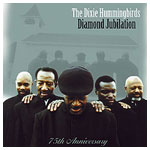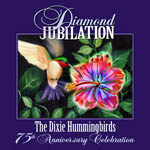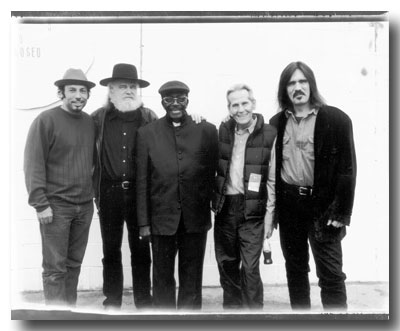United Press International Interview/Feature
The Dixie Hummingbirds Celebrate Its Diamond Anniversary With A Jewel
By Crystal Caviness


|
NASHVILLE (Oct. 30, UPI) - When Ira Tucker joined up with the Dixie Hummingbirds to sing, he figured
he'd give it a couple of days to see if it would work out. If it didn't, he knew he could walk the 29
miles back home from Greenville, S.C., to Spartanburg, S.C. It was 1938 and Tucker was 14. Now,
as the Dixie Hummingbirds celebrate its 75th year together, Tucker acknowledges that he never
had to walk back home; obviously, it worked out.
The Dixie Hummingbirds, possibly the longest-running singing group in modern music history, celebrates its diamond
anniversary with "Diamond Jubilation," a Rounder Records project which was released Oct. 7.
The 11-song record teams the black gospel legends with some of rock's most formidable personalities,
from keyboardist Dr. John to members of The Band, the legendary group from the Sixties
who toured and recorded with Dylan for a time. A book about the group, titled
"Great God A'Mighty! The Dixie Hummingbirds" by Jerry Zolten, also has been released.
To add to its celebration year, Bob Dylan has featured the gospel quintet on the soundtrack for his film "Masked and Anonymous."
It's a busy time.
James B. Davis organized the Dixie Hummingbirds in 1928 in Greenville,
a group of church-singing youth who wanted to take their show on the road.
The band was already well-known and working steadily when Tucker joined up ten years later.
"I was 14 and I left school," Tucker, 83, said recently. "Because my mother was sickly, I needed a job to help support her.
So I just took a long shot chance...They needed a tenor, but I was signing baritone. So I
told Davis it's 29 miles from Spartanburg to Greenville and if I don't make it, I'll just walk home. And he said that's fair enough.
"That was in 1938 and I'm still here."
Despite the challenges of touring in the heart of the South at a time
when segregation was commonplace, the black gospel group kept at it.
"You had to carefully plan where we were going to stay," Tucker
said about those early touring days, "because there were no hotels available for us.
There were rooming houses and in the car. We did a lot of sleeping in the car."
Tucker had not been with the Hummingbirds long when they moved to Florida,
which fulfilled Tucker's grandfather's dream for his grandson.
|
|
"My grandfather said to me once not to give up singing because one of these
days I’d be in Florida," Tucker said. " I said to myself, he had a far-fetched
spirit, he could see a long way, because he had never been out of South Carolina."
The band's move to Florida stemmed more from reality than from dreamy goals.
"South Carolina had an inspection law and our car would not pass inspection,"
Tucker said. "But Florida during that time didn’t have an inspection, so we worked
out of Jacksonville for six months at first and then two years."
From Jacksonville, the group moved to Philadelphia in 1942, the city they now call home.
"When we went to Philly in 1942, there was a radio station, WCAU, a 50,000-watt station," Tucker said. "During that time, Mr. Stanley Broslin, the manager, they had heard us on acetate. They booked us on a show called '90 Minutes From Broadway.' That was a six-month contract that really started changing things for us."
At the same time the Hummingbirds were performing in Philadelphia, they also booked a six-month contract in New York City, under the name of the Jericho Quintet. The gigs kept coming and soon they were playing at Cafe Society, New York's first integrated nightclub, where they were backed by jazz saxophonist Lester Young.
"That was the top club we had been in," Tucker said, recalling his career to that point.
As the decades clipped by, members of the Hummingbirds found themselves playing at the Apollo Theater during the Fifties, the 1966 Newport Folk Festival, and, in 1973, singing backup to Paul Simon's hit "Loves Me Like A Rock." The Hummingbirds later won a Grammy for its version of the tune in 1974.
Around this time, in the mid-Seventies, the Hummingbirds regularly played a small church outside of Jackson, Miss., part of a circuit that the Fairfield Four and the Nightingales also played. Larry Campbell, a young, white musician steeped in rock, blues and zydeco, frequented this church in order to catch the musicians coming through. It was here that Campbell first saw the Hummingbirds perform.
"After seeing the Hummingbirds down there, I went back to where I was living that night and I wrote this song," Campbell said recently from Munich, Germany, where he is touring Bob Dylan. "This was in the mid-70s. And not being in the gospel world, I thought I’d never have any use for it. I was just so inspired, I wrote this tune."
What neither Campbell nor the members of the Hummingbirds knew was that thirty years later, they would join together for a project: Campbell as producer, the Hummingbirds as artist. And that song would find its home.
The story of how these musicians from opposite ends of the musical spectrum found themselves in the same studio is just one of the coincidences, as some might call them, which became typical of the making of "Diamond Jubilation."
Tucker was recovering in a Philadelphia hospital room when another patient was placed as his roommate. As the two men chatted, the roommate, Harry B. Klause Jr., told Tucker that his son, Jerry, owned a record label. Tucker told Klause that he was a singer and his group had just lost their record contract and they were searching for a new one. When Jerry Klause visited his father in the hospital, he agreed to sign the Hummingbirds.
At the same time, Jerry Klause was searching for a project for Campbell to produce, preferably one that would bring in members of The Band.
"Everybody talked and the idea germinated there and we decided to do a record with the Dixie Hummingbirds and we just put two and two together and thought (The Band's) Levon (Helm) and Garth (Hudson) and us together with this, what a great combination this could be," Campbell said.
|

|
Once in the studio, the musicians found themselves part of a mutual admiration society, as the Hummingbirds singers watched in awe while Campbell, George Recile and Tony Garnier, from Dylan's band, along with Helm and Hudson from The Band and the legendary Dr. John put music to their lyrics that had never before been attempted. Likewise, the studio musicians sat in awe of Tucker and the other singers.
"Ira Tucker was legendary to me," Campbell said. "These guys are so real. They are not capable of any pretense. They sing what they are. To be around that, that’s why you play music, to find that.
"Each one of these guys is immensely talented. Ira and Bill Bright, who does the other lead singing on the record, they are just born with this," he said. "It’s just pure soul...There’s a real common thread between where Levon and the guys in The Band came from and where these guys and where Bob Dylan comes from and, musically, where I come from. There’s this commonality in there that we were searching to find and I think we found it."
Tucker admitted that at first he wasn't sure of the end result of Campbell's vision.
"I’m elated over how it came out," Tucker said. "I didn’t understand how Larry would do it. He said OK, I’ll take you one-at-time. When he had it finished, it came together. He’s good at producing. He has one more imagination. Those musicians, those guys have been around. We were just blessed to get these musicians...I told one guy (in my band), you guys have to get busy, we’re going to have to sound like that record. That’s what we’re working on now."
Indeed, "Diamond Jubilation," which currently features singers Lyndon Baines Jones, Frank Frierson, James Williams and Enoch Webster, in addition to Tucker and Bright, sounds differently than other Hummingbirds' recordings.
Campbell added instruments, such as resonator guitar, mandolin, standup bass, harmonica and accordion to the gospel songs in arrangements that combine an assortment of American music.
"The Hummingbirds have always been a pretty sophisticated gospel group," Campbell said. "The Hummingbirds have always been 'tuxedo' gospel, where this might be closer to 'overalls' gospel, wearing overalls. But it’s not a stretch at all. There’s never been any pretense in what they’re doing. Their harmonies have always been very sophisticated. And their sense of melody and chord changes has been sophisticated. This is less of that. It’s more earthy, more rooted in tradition. That’s the stuff that I know. As a producer, that’s what I was able to bring. These guys didn’t have to change anything to get there. They just capitalized on that aspect of what they do."
At some point during the making of "Diamond Jubilation," a thought kept nagging at Campbell.
"When this project came around, there was something itching me in the back of my head," he said. "I thought, I’m missing something here. And I remembered that I had written this tune (in the Seventies) and I slept on it and it all came back to me. I demoed it and I played it for these guys and they loved it and it ended up on the record. The song is 'Someday.'
"Little things like that were happening on this project from the very beginning. If you’re religious, you’ll say it was blessed. If you’re not religious, you’d just say it was fate...Little coincidences, like pieces of a puzzle falling together."

|
|

